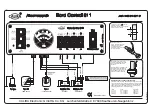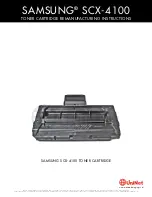
●
For running pace to hard running - (40%-70%).
●
For jumping about or with very hard action on uneven surfaces -
(60%-100%).
Note:
As with the spring adjusters you should do a similar style of
Bounce Test
to make sure both damping cartridges are set the same.
First set the Payload Spring Adjusters to the exact level and then
bounce the loaded stabilizer. If say the gimbal bounce leans towards
the right side then the right has more damping than the left and you
need to increase the left side damping adjustment or decrease the
right side adjuster.
Once set, do the bounce test to confirm
As with the spring adjusters you should do the same
Bounce Test
to
make sure both damping cartridges are set the same. As the payload
springs are already adjusted you just do the bounce test with the loaded
stabilizer. If say the gimbal bounce leans towards the right side then the right
has more damping than the left and you need to increase the left side
damping adjustment or decrease the right side adjuster.
Damping -> Shoot, Analyse, Adjust, Repeat
This process is useful to do in advance so that you don’t need to go through the
full process when on a shoot. You’ll work out the damping settings for different
filming movements from very soft motion to very hard action.
Since you have already found the ‘ideal’ Payload Spring Setting for your rig you
can start with that setting to next find the best damping adjustments for your
own personal filming styles.
19
User Guide - AirFlo Duo - 4th Axis Stabilizer - 20181209 ScottyMakesStuff.com










































